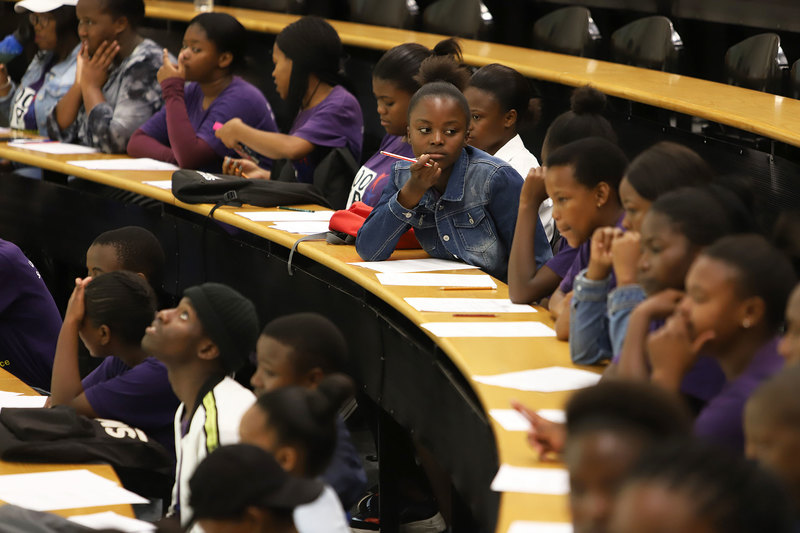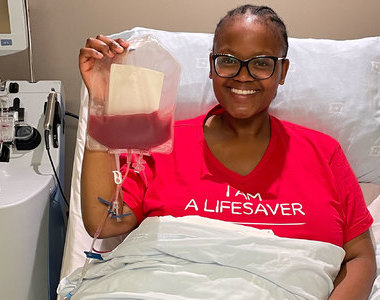Cool science behind CSI, global warming and gene editing
18 February 2020 | Story Helen Swingler. Photos Michael Hammond. Read time 8 min.
It was heady stuff for 100-UP matrics on a Saturday morning – a customised menu offering cool science presentations on forensic investigation, global warming and genetic engineering – all delivered by top University of Cape Town (UCT) researchers.
The UCT Schools Development Unit’s 100-UP programme is now in its eighth year, and the animated group that arrived on middle campus by bus on Saturday, 15 February, knew that they were in for a treat. The Saturday programme introduced them to the many facets and interfaces of science, drawing on three lectures presented at the Centre for Extramural Studies’ (EMS) Summer School.
100-UP is a three-year enrichment programme that harnesses 100 talented learners in grade 12 in Khayelitsha, who are coached and mentored in preparation for tertiary studies at UCT and other institutions in South Africa. Through its Gill Net component, about 100 extra matriculants from Khayelitsha and Mitchells Plain are brought on board and receive a condensed programme of assistance towards tertiary study. The Gill Net hopes to extend its reach to matriculants from Philippi soon.
Life-long learning
Essentially, the programme works to strengthen learners’ abilities in core academic areas such as maths, science and English additional language. Importantly, as Saturday’s event demonstrated, it also creates opportunities for learners to visit campus and acquire the skills and experiences they will need for university.
The mini Summer School is part of EMS’s outreach programme, supporting the unit’s transformation work. It continues the theme of life-long learning that is the hallmark of Summer School, said EMS director Dr Medeé Rall.
“Always be curious. Always learn. Always read.”
“It’s also an important first step onto campus. The aim is to establish an early relationship with learners and introduce the possibility of recruiting them as future students and graduates.”
A large proportion of these students do go on to university, even if it’s not UCT. In 2019 the programme recorded an 85% pass rate – and 82% of those learners are now registered at tertiary education institutions. This year 178 students on the 100-UP+ programme (those who’ve made the transition to university) are studying.
Introducing herself to the learners on Saturday, Rall said that school and university wouldn’t be the end of their learning. Life-long learning is key to growth, she said, referring to the many people who return to UCT’s Summer School each year.
“Always be curious. Always learn. Always read,” she advised.
Who dunnit?
First up on the programme was Dr Marise Heyns of the Division of Forensic Medicine, who introduced learners to the world of forensic investigators – CSI for real, where things are not always what they seem (cue the scary music).
To stand up to legal scrutiny, their evidence must be meticulously gathered, managed and documented. And physics, biology, chemistry and other sciences help in interpreting evidence: patterns in glass shattered by a bullet, the direction and form of blood spatters on a wall, etc.
Heyns has presented lectures at mini Summer Schools for some years.
“I find the interaction with the scholars invigorating as their enthusiasm is contagious.”
“I find the interaction with the scholars invigorating as their enthusiasm is contagious. It buoys one up and it is a great feeling to ignite the interest and passion in these young minds,” she said.
“It’s a wonderful opportunity to engage with young scholars, and it gives you the opportunity to approach your discipline from another viewpoint, specifically forensic science, which is taught at postgraduate level.”
Cloudy with a chance of warming
Next up was Dr Peter Johnston of the science faculty’s Climate System Analysis Group, whose weather and rainfall data from the Western Cape over the past century showed why global warming and climate change are real and present dangers. Science, he said, countered the arguments of global warming denialists.
His skill as a communicator showed in his rapport with the grade 12 learners and built on his experiences as a science and geography teacher at Dale College (1986–88), Pinelands (1989–96) and Zonnebloem (1996–99).
“I enjoy and value being able to communicate knowledge and enthusiasm with young folk.”
“I enjoy and value being able to communicate knowledge and enthusiasm with young folk.”
The impacts of climate change can be mitigated by reducing carbon in the atmosphere and minimising our carbon footprint, he said.
“But as mitigation is unlikely to be fast enough to keep CO2 limits within reasonable and acceptable levels, we will have to adapt to a future climate that threatens water, agriculture and health.”
There was a possibility of other Day Zero scenarios in the Western Cape, he added, making it imperative to rethink our use and abuse of water.
One idea for domestic water design showed a washing machine combo, a high-tech unit that uses wash and rinse water to flush toilets. It’s not far-out science either, just common sense, Johnston said.
“The critical skill is to apply basic science in new ways to solve everyday and complex problems.”
Design a baby
Emeritus Professor Anwar Mall ended the morning with a presentation on gene editing, based on the book by Jennifer Doudna titled A Crack in Creation that ventures into the world of designer babies and other scenarios where “truth is stranger than fiction”.
Humans can now correct mistakes in the genes they’ve inherited from their parents and even change these genes to suit their desires.
“The age of the designer babies is upon us, and the process by which we do this is called gene editing.”
“The underlying aim here is to transmit the idea that learning is fun and that whatever is learnt increases their understanding of reality.”
Anwar said that after his many years of teaching at UCT, he felt privileged to have the opportunity to participate in the 100-UP programme “to support and encourage youngsters wishing to continue studying after matriculating”.
“The underlying aim here is to transmit the idea that learning is fun and that whatever is learnt increases their understanding of reality. To pursue higher education is a worthy goal, and living a life of the mind can be very enriching. Very importantly, hard work is emphasised together with the importance of reading within and outside one’s field.”
Win-win learning
For grade 12 learners Thukela Makohliso, Athabile Booi, Aloncedo Masentse and Zenande Neaphaneapha from the Chris Hani Arts and Culture High School in Khayelitsha, the 100-UP mini Summer School was an eye-opening experience.
All four said they were working hard in their final school year, but found it demanding. They have their eyes on tertiary education and were weighing up funding and course choices.
“I’m still undecided, but I want to be in health sciences,” said Makohliso. “Medicine or occupational therapy.”
“I want to do something that has to do with chemistry,” said Neaphaneapha. “But I’m not sure which career I’ll choose, or which university.”
Ferial Parker, project manager for 100-UP since 2011, said that over the years the project had played a critical role in helping over 1 000 young learners from Khayelitsha and Mitchells Plain access tertiary education.
“It feels so good when they contact you out of the blue and say, ‘I have made it Mrs P; I have graduated. All thanks to 100-UP!’ ”
 This work is licensed under a Creative Commons Attribution-NoDerivatives 4.0 International License.
This work is licensed under a Creative Commons Attribution-NoDerivatives 4.0 International License.
Please view the republishing articles page for more information.
Listen to the news
The stories in this selection include an audio recording for your listening convenience.





















































































































































































































































































































































































